Many people have asked me how to get into property management and what types of jobs are there in the pm industry? Take a look at these insider tips and information as they may illuminate a property management career path that you might not have considered.
Property Management Career Path
How to start a career in property management depends on many factors and decisions such as education, training, desire, and industry segmentation. Unlike other traditional occupations that have a linear progression to the desired career, steps into property management jobs have varied paths. Let’s grab a cup of coffee and dive into the pm job options available.

There are two main roads into the property management industry, also known as the rental industry: commercial or residential. Within those two segments are dozens of opportunities for someone to get into property management.
COMMERCIAL PROPERTY MANAGEMENT: where a business is conducted, products are produced, services are rendered, or entertainment is available which gives opportunities to manage:
- Retail Buildings
- Shopping Malls
- Warehouses
- Storage Units
- Manufacturing
- Sports Arenas
- Entertainment Venues

RESIDENTIAL PROPERTY MANAGEMENT: Dwellings for housing, whether long or short term are segmented further by type of property use, building structure, and resident needs.
Multi-Unit Housing
- DuplexQuad-plex
- Apartment
- Condominium
Short-Term Rentals
- Student housing
- Corporate housing
- Government housing
Medical Housing
- Nursing homes
- Assisted living
- Long-term care facilities
Low Income Housing – These may include specialty housing with age and income criteria.
Vacation Rentals – These short-term rentals can range in size from room rental to an entire estate rental. Sometimes during off-seasons, a vacation rental may be let for extended-stay to keep the occupancy rate and income up. These would include cabins, resorts, inns, time-shares, and the like.
Specialty Housing – Communities that are often under unique housing regulations such as Mobile Home Parks, also known as Mobile Home Communities, or Modular Home Communities, RV parks
Of course, if a state allows, there may be other types of property rentals such as houseboats, mother-in-law units, campgrounds, tiny home villages, and the like.
With the above types of rentals, the path continues to diverge with specific roles within that segment.
What Types of Jobs Are There in the PM Industry
How to get into property management comes with understanding the different segments above and also knowing what types of pm jobs are common to the industry.
Using an internet search on job posting sites will result in a plethora of information. For instance, currently, on Indeed.com there are over 300 new jobs using Property Manager as the keyword.
It goes to follow that a property management job posting that includes the term coordinator, manager, expert, director, agent, specialist, or advisor, typically requires education and experience.
You’ll notice some other specialty designations (tax credit, HUD, HOA, Section 8, senior housing) in the title that may indicate additional experience, certification, or training required.
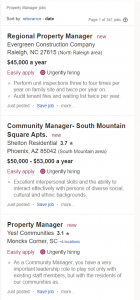
A quick search for Property Manager positions on Indeed.com will result in a plethora of positions. Doing a job search is a great way to gain knowledge regarding the requirements and education necessary.
How to Get Into Property Management With no Experience In the Industry?
You may be saying, “Great, but I have no experience or formal education, can I still find a job in property management?”
So glad you asked, as that brings us to the next point. Getting your foot in the door isn’t as difficult as it might seem.
There are many entry-level positions available that will not only give you the experience you’ll need, but you’ll gain transferable skills to help you move up to more responsibilities and better positions.
For example, if your heading to college and planning on living in the dorms, you may wish to apply for a Resident Advisor position. RA’s do many of the same tasks as a property manager such as rule and policy enforcement, disseminating information, coordinating and hosting events, processing maintenance or repair requests.
When reviewing property management jobs online look for some of these job positions titles:
- Front Office Clerk
- Back Office Support
- Self Storage Clerk
- Public Storage Part-Time Relief
- Hotel Front Desk Clerk
- Maintenance Assistant
Keep your eye open for jobs in the property management industry with ‘Assistant” in the title. They are usually entry-level, requiring little to no experience.
Also look for wording such as ‘training available’, ‘on the job training’, ‘experience preferred but not required’, and ‘no experience necessary’.
Some rental communities have a hierarchy of regional and district managers who oversee the higher-level tasks and responsibilities. That may allow for onsite (meaning live on the property) or off-site positions that require no experience. This was where I was able to get my foot in the door at the beginning of my property management career.
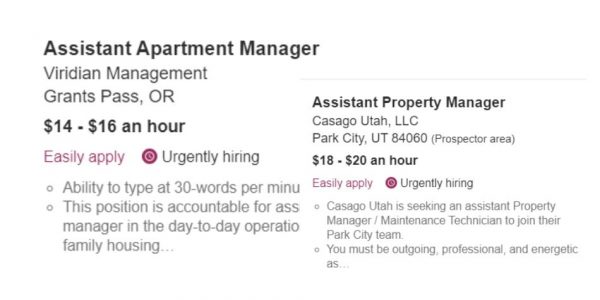
Besides the Traditional Route…
How Do I Get Into Property Management?
Besides starting with the above suggestion of building a resume with an entry-level position in the property management field, there are some non-traditional options available.
For the adventurous type, you may consider some cool unique and seasonal jobs such as becoming a campground host, farm or ranch assistant, work in guest services, work at a lodge or resort.
Even if it’s operating a gondola at a resort (and those jobs exist!), working with the public in seasonal work provides many transferable skills and experience from public relations to maintenance issues.

You might even consider working abroad. One of my first jobs after high school was volunteering in Asia. For three of my six years in Asia, in addition to other duties, I managed two apartments for other traveling volunteers.
I didn’t know it then, but those tasks of making sure everything was clean and in working order, coordinating schedules, providing area information, etc. certainly afforded me some resume-building experience and a lifetime of memories.
The beginning is not an indicator of the outcome,
but it’s a start.
If you wish to work with your significant other, there are a plethora of onsite positions for management teams that don’t typically require much in way of experience.
After I started managing properties state-side, my husband joined me and that first onsite position lead to promotions that found us managing a portfolio of resort vacation rental properties. Not only did we thrive in the experience, being a part of a co-working team enhanced our bond as a couple.

Public storage facilities may have onsite management positions and as well as part-time relief and desk clerk positions available.
Jobs that offer co-sharing responsibilities with a significant other typically also include housing. Community management, such as mobile home parks, apartments or condominiums, or public storage facilities are often the place to look for onsite living opportunities.
How Do I Start a Property Management Company
You may wish to take your career in another direction and become either a private landlord or a property management company (managing your portfolio and/or other owner portfolios). A clever entry into that world would be to invest in a duplex, that’s how a previous employer started his investment portfolio.
He said that instead of purchasing his first home as a single dwelling unit, he chose a duplex which allowed him to rent one side while living on the other. He gained rental management experience and was able to leverage that purchase and grow his portfolio.
If you didn’t want to live in a duplex, there are other investment opportunities to try, such as getting involved in an investment group to share in the risk and rewards. Or be a private landlord by investing in a turn-key property or fixer-upper to rent.
Inherited properties often can become an entry point to being a landlord. Some families create trusts or formal companies to manage those assets.
Pursuing a Property Management Career Requires…?
General office skills are important so if you haven’t already, brush up on your typing and word processing. Having a head for numbers is helpful when dealing with collecting payments and calculating late fees or returning portions of security deposits.
Fortunately, in this day and age, there are fantastic property management software systems available to help with the calculations. With or without bookkeeping tools, it’s important to have an eye for details.
From my many years of experience in managing, hiring, and consulting in the property management industry, soft skills are THE most important requirement.
Soft skills that are important for property management jobs are:
- Communication
- Time Management including organization and focus
- Interpersonal skills such as empathy and diplomacy
- Problem Solving which requires creativity
- Leadership – which involves teamwork
- Adaptability
It’s important to become competent with rental terminology like payment processing, to be familiar with disaster planning, and tenant relations.
Landlords and property managers wear many hats and being informed and current with blogs for property managers to follow helps keep those hats on properly.
As you start at an entry-level pm job, you’ll be building your property manager resume and you’ll want to pursue training and education to round out those details.
It may require substantially more to start a property management company or climb the industry ladder; such as certifications.
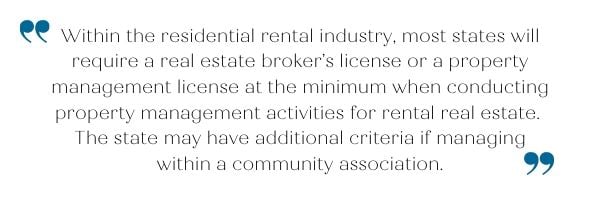
Property Management Qualifications
The qualifications such as certification ultimately depend on the type of property management jobs you wish to pursue. Knowing the ins and outs to answer the question of what does a property manager do, requires a willingness to learn.
In general, if in a management position, some type of education is necessary such as certification, college degree, continuing education, in addition to lessons learned through experience.
Within the residential rental industry, most states will require a real estate broker’s license or a property management license at the minimum when conducting property management activities for rental real estate.
The state may have additional criteria if managing within a community association.
If you decide to apply to a company in the rental industry, they will likely inform you if prior certification is required.
Some companies will provide the training necessary to become certified.
If you decide to invest and manage your own and/or other owner’s properties, to find out what type of training is required to be a pm be sure to check with your state regulations to ensure you comply with education and certification requirements.
Each state will have different criteria and steps to take to obtain real estate brokers licensing.
Regardless of where you begin your journey if you enjoy helping others and like a fast-paced and interesting career, the question isn’t how to get into property management but rather, what are you waiting for? Opportunities abound and waiting for smart good-hearted people like YOU!
Property Management Certification List in the US
Below are certifications available in the US. Some require membership, experience, and other criteria where others do not.
Certified Manager of Commercial Properties (CMCP) from the Building Owners and Managers Association International (BOMA)
National Property Management Association (NPMA)
Certified Professional Property Specialist (CPPS)
Certified Professional Property Administrator (CPPA)
Certified Profesional Property Manager (CPPM)
Certified Manager of Community Associations (CMCA) from the Community Association Managers International Certification Board (CAMICB)
National Apartment Association (NAA)
Certified Apartment Manager (CAM)
Certified Apartment Portfolio Supervisor (CAPS)
Certificate for Apartment Maintenance Technicians (CAMT)
Certified Apartment Supplier (CAS)
National Apartment Leasing Professional (NALP)
Institute of Real Estate Management (IREM) offers these certifications:
Certified Property Manager (CPM)
Accredited Residential Manager (ARM)
Accredited Commercial Manager (ACoM)
National Association of Residential Property Managers (NARPM)
Residential Management Professional (RMP)
Master Property Manager (MPM)
Certified Support Specialist (CSS)
Certified Maintenance Coordinator (CMC)
Certified Residential Management Bookkeeper (CRMB)
National Center for Housing Management
Certified Occupancy Specialist (COS)
Enterprise Income Verification Specialist (EIVS)
Certified Occupancy Specialist – Advanced (COSA)
Certified Occupancy Specialist – Public Housing (COSP)
Certified Voucher Specialist (CVS)
Management and Occupancy Review Specialist (MORS)
Registered Housing Manager (RHM)
NCHM Low Income Housing Tax Credit Certifications
Additional NCHM Property Management Certifications
This article was originally published in Janurary 2020


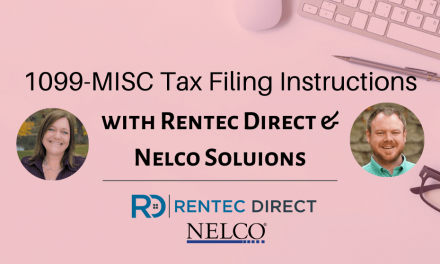

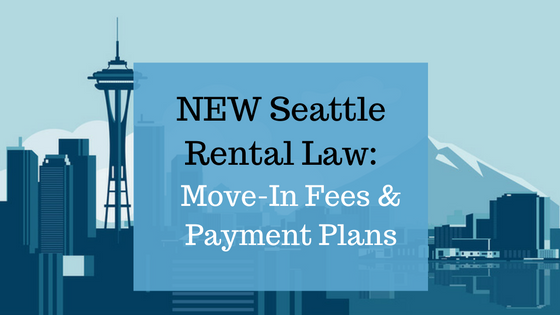


Wow, another excellent article, Heather. I would add if you know someone who may get in trouble for managing their own property, gently suggest that you help them. There are times that a landlord could jeopardize their property, and even their lives, if they do not follow due diligence in tenant screening. Education is the answer! Just relying on a handshake is never a good business practice when renting.
Hi Dede, Thank you for your kind words! Yes, great advice and insight! A private landlord may not need certification in some states but all landlords should go into the rental business by knowing their local and state regulations as well as common and professional practices in the industry. Research, finding a mentor, networking, hiring a consultant, and joining an association are great ways to navigate those waters.
Great job! And thanks for sharing a very nice information…
Thank you for your kind words, Owen! Glad you liked it.